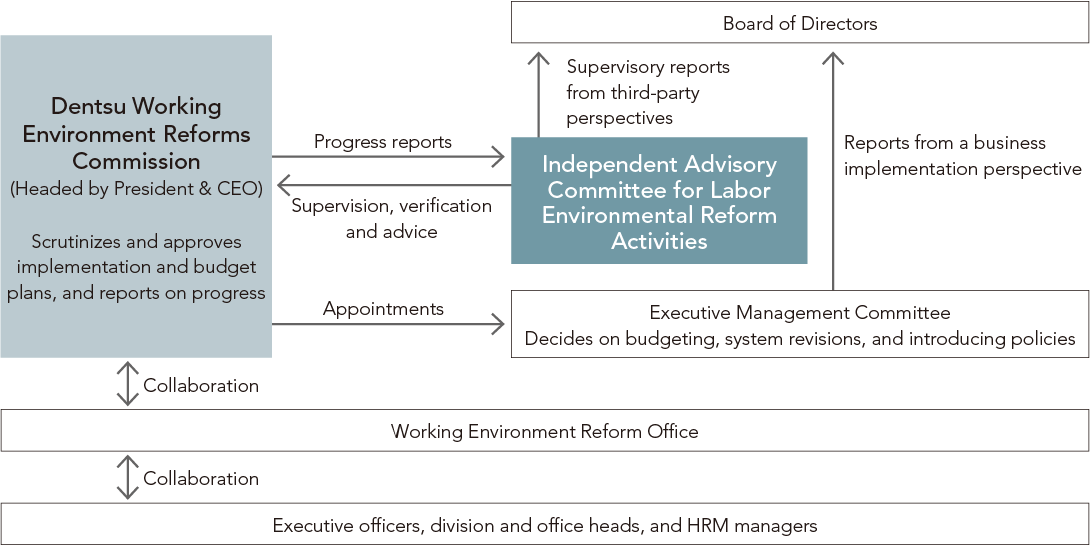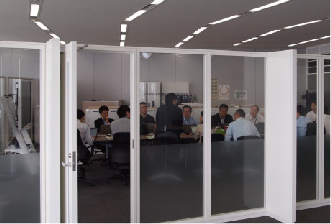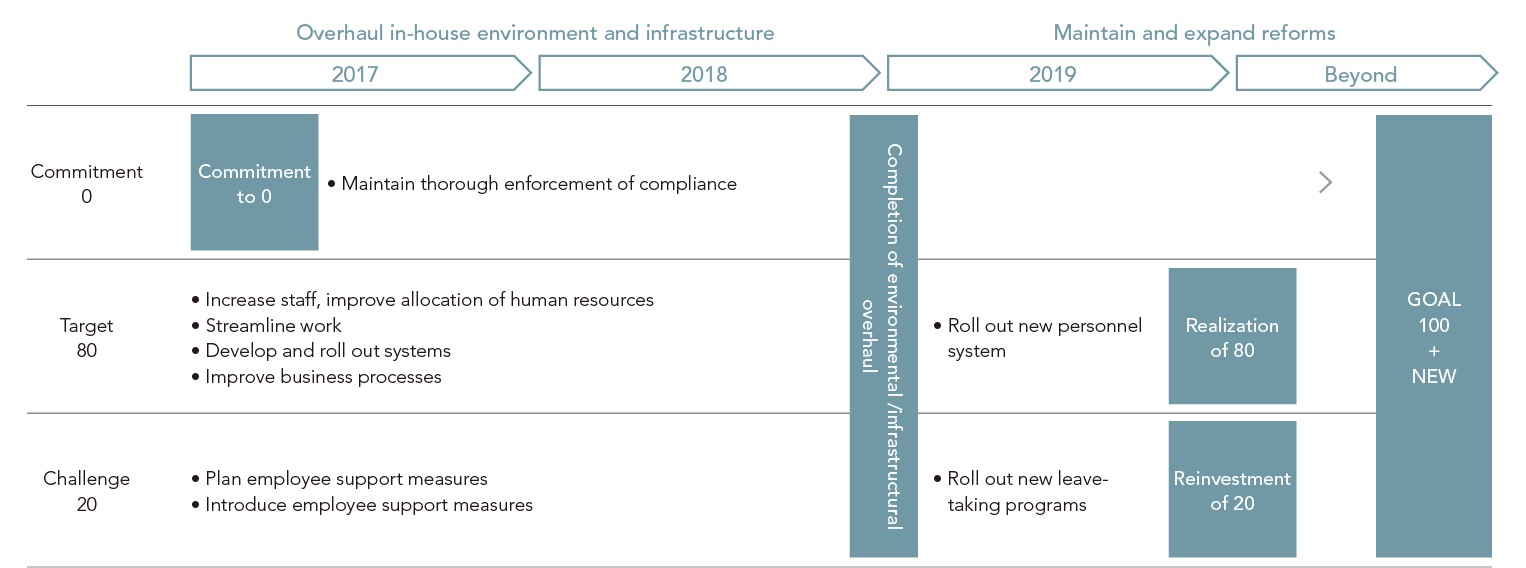To improve our Japan work environment, we were taking steps recommended by a labor standards inspection office when, in December 2015, one of our promising young employees, the 24-year-old Ms. Matsuri Takahashi, took her own life. The Group has been charged with violating the Labor Standards Law. On October 6, 2017, the Tokyo Summary Court pronounced a guilty verdict and imposed a ¥500,000 fine.
We recognize the significance of the responsibility and feel deep regret. Thus, we are implementing Group-wide reforms in Japan to improve the work environment. To prevent excessive overtime, Dentsu reaffirms that employees are its most important resources and recognizes the importance of looking after each and every employee. Management is currently giving top priority to employee working environment reforms in Japan. Providing a work environment that ensures the mental and physical health of employees is our social responsibility, as is their personal development as they follow career tracks and work styles reflecting their values. In November 2016, we launched the Dentsu Working Environment Reforms Commission to promote work environment reform and enforce compliance. Immediately after, we launched initiatives to deal with the most urgent issues, such as preventing long working hours and the recurrence of labor issues. We considered concrete steps to optimize workloads, reviewed each system, assessed management appropriateness, and redefined our corporate culture. In December 2016 we moved to reform the work environment based on eight pillars.
Fully compensate for a reduction in overtime pay in 2017 through bonus payments.
We have implemented various structural reforms to promote Company-wide work environment refroms in Japan. In December 2016, we placed HRM managers in each division, and created a system to ensure the time and health management of employees, the prevention of harassment, and optimized work assignments.
In February 2017, we set up an Independent Advisory Committee for Labor Environmental Reform Activities, comprising outside experts. Committee members have been asked for advice on, and to monitor, work environment reforms, to supervise and verify the progress of these initiatives.
A new outside director appointed at the Ordinary General Meeting of Shareholders in March 2017 was added to the Board of Directors. We plan to strengthen discussions regarding the work environment reforms.
Meanwhile, the Dentsu Working Environment Reforms Commission has been steadily implementing reforms based on the eight pillars, as well as creating new initiatives. These reforms are expected to bring fundamental changes to the nation’s long-standing work culture. We have held dialogues to emphasize transparency, so that each employee might have a voice and an understanding of work conditions. We collected about 25,000 opinions through surveys and internal dialogues. Based on employee input and talks with outside experts and Independent Advisory Committee members, in July 2017 we devised our Working Environment Reform Plan.
The Work Environment Reform Plan to create a New Dentsu has four stages: Commitment, Target, Challenge, and Goal. This medium- to long-term action plan includes steps to reach the final stage.
The first stage, Commitment, embodies our commitment to ensure that we fully comply with laws and regulations to prevent the reoccurrence of labor issues. We vow to reach zero violations of Article 36 of the Labor Standards Act, zero harassment, and zero overwork. Included are concrete initiatives such as the ongoing prohibition of late night work as stipulated in the eight pillars of the work environment reform, the introduction of a work efficiency metric to the evaluation criteria, and the strengthening of reporting and advising systems for harassment.
Work Environment Reform: Implementation, Monitoring Framework


The Target stage aims for a 20% reduction in the total number of hours worked per employee while maintainingn 100% of the output. In terms of the work environment and nworkflow reforms, we are already promoting the hiring of full-time employees and the review of workflows. We plan to implement many measures such as satellite offices and work-from-home systems.
Through the Commitment and Target stages, we aim to prepare for reform, and achieve the objectives of these two stages by the end of 2018. The Challenge and Goal stages involve further maintenance and expansion of reforms. In the Challenge stage, following the 80% cut in total working hours achieved in the Target stage, the aim is to support staff personal growth by using the 20% additional time to improve the mental and physical health of employees and enrich their daily lives through experiences and learning opportunities. We plan to strengthen support systems and create new systems, such as increasing the number of vacation days that can be taken consecutively and strengthening support systems for nursing care, childcare, and volunteering.
The last stage, Goal, refers to our goal of creating a New Dentsu by enabling growth of our employees and the Group by switching to new work styles. We will continue Company-wide efforts to promote these work environment reforms in order to reach our goal even one day sooner.
Work Environment Reform Plan

Work Environment Reform Process

© DENTSU GROUP INC. ALL RIGHTS RESERVED.
We use cookies to improve your experience and our services. We also share information about your use of our website with our analytics partners. You can change your cookies settings, please see our Cookie Policy. Otherwise, if you agree to our use of cookies, please continue to use our website.